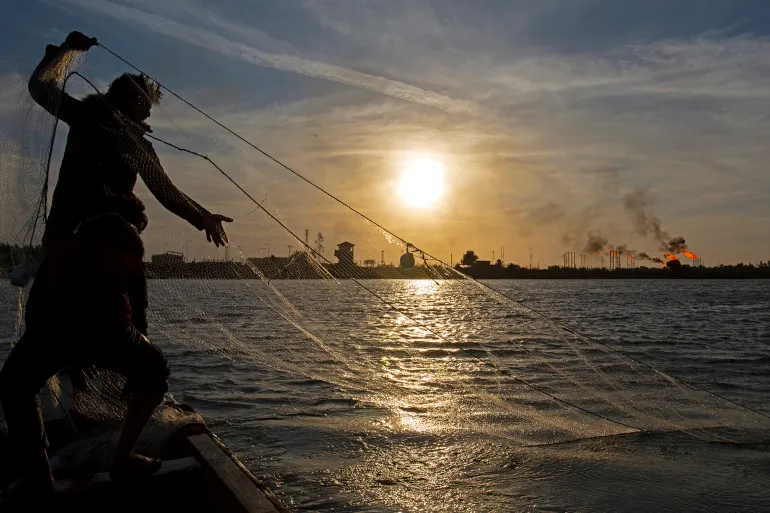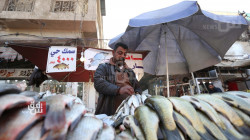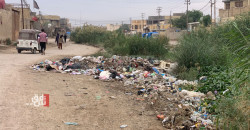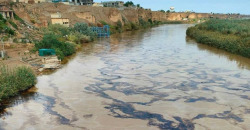"Killer" fish invades Iraq’s rivers: What to know about Tilapia

Shafaq News/ In recent years, the appearance of Tilapia in the marshes of southern Iraq has raised concerns, with the fish's origins still unknown. The Iraqi Ministry of Agriculture has confirmed that these fish pose a significant threat to the local ecosystem and native species, including Carp and Barbel.
Tilapia, an invasive species in Iraq’s rivers and water bodies, is believed to have entered the country through the Euphrates River from Syria. It has since spread across several Iraqi provinces.
The new fish belongs to the Cichlidae family and originates in Africa. It thrives in both freshwater and brackish waters in tropical and subtropical regions.
What makes Tilapia particularly concerning is its ability to adapt to a wide range of environmental conditions, including its resistance to high water density and its ability to survive in low-oxygen environments.
This invasive species presents a major risk to Iraq’s biodiversity, leading to a decline in local fish populations and hindering their reproduction, which threatens the balance of the food chain, that depends on a stable natural equilibrium.
In an interview with Shafaq News, Walid Al-Zurfi, Director of the Livestock Depratement at the Iraqi Ministry of Agriculture, emphasized that the ministry has no involvement in Tilapia farming or its propagation, especially as it reproduces independently.
He further explained that "the ministry plans to increase native fish populations such as various types of Carp, and local species like Catfish and Barbel."
Tilapia has spread across a variety of natural habitats, including harsh environments where native Iraqi fish cannot survive. This rapid spread is threatening the presence of indigenous species in Iraq’s water bodies.
In response, the Ministry of Agriculture took several measures last season, releasing approximately 200 million fish larvae, around 9 million carp fingerlings, and 450,000 local fish. However, the impact has been limited, as "Tilapia consumes the eggs of these fish and competes for food, thereby reducing their numbers," according to Al-Zurfi.
The ministry has no specific information on when tilapia first entered Iraq’s rivers. There are currently efforts to explore the possibility of cultivating Tilapia for economic benefit.
According to Al-Zurfi, "We will turn to investors to adopt Tilapia farming."
Tilapia is typically farmed in drainage ditches, which contain agricultural runoff, including fertilizers and pesticides that affect the health of the fish, particularly their scales, although not their internal body. Al-Zurfi notes that "the decision to sell Tilapia in the markets is the responsibility of the Ministry of Health, not the Ministry of Agriculture."
Fish producers have expressed growing concern over the spread of Tilapia, considering it a foreign species in Iraq’s ecosystems.
Iyad Al-Talebi, head of the Iraqi Fish Producers Association, told Shafaq News that "Tilapia first entered through Basra years ago, spreading to Nasiriyah, Babil, and other provinces. It is now on the outskirts of rivers in Baghdad."
The spread of Tilapia is concentrated in Basra, where it causes significant pollution, and it reproduces up to four times a year, with each fish potentially weighing up to 100 grams. While it is not yet widely desired in the Iraqi market, Tilapia preys on local fish species that are popular for consumption.
Al-Talebi believed that the local government’s measures have been ineffective, urging the establishment of a Tilapia farming facility to extract protein for use in animal and fish feed.
On the other hand, some fishermen view Tilapia more positively. Abu Ali, a fisherman from Babil province, sees economic potential in the fish due to the scarcity of local species, particularly since they "disappear in winter and do not appear in the marshes or rivers."
In an interview with Shafaq News, Abu Ali noted that the price of Tilapia ranges from 250 to 500 Dinars ($0.19-0.40), with increasing demand from low-income families. "Therefore, I target poorer neighborhoods to sell Tilapia there."
While Abu Ali disagreed with the label "killer fish" due to its impact on other fish species, he argued that Tilapia still has nutritional value and "provides a livelihood for many families during the winter season."





